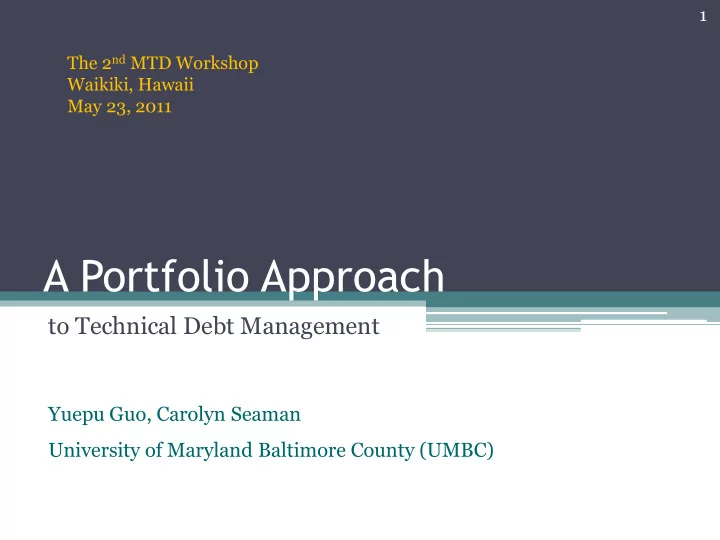

1 The 2 nd MTD Workshop Waikiki, Hawaii May 23, 2011 A Portfolio Approach to Technical Debt Management Yuepu Guo, Carolyn Seaman University of Maryland Baltimore County (UMBC)
2 Overview • Effects of Technical Debt • Goals of Managing Technical Debt ▫ Balance short-term benefit with long-term cost Short Term Long Term ▫ Make better decisions on Effect Effect What technical debt items should be incurred or paid? When to incur or pay them? • Perspectives ▫ Technical debt is a software risk Potential loss – requires extra effort in future (interest) Uncertainty – may or may not incur interest Risk management Approaches ▫ Technical debt is an asset Short-term benefit Variable returns through different investment strategies Investment approaches, e.g., Portfolio Management
3 Portfolio Management • Portfolio ▫ Combination of different types of assets ▫ Risk reduction strategy weighted sum ▫ Decision making process of the expected Determining the types and amounts of assets returns of the • Principle constituent ▫ Different volatility and performance patterns assets ▫ Reduced investment risk through diversification • Modern Portfolio Theory standard ▫ Mathematical model of the diversification problem deviation of the ▫ Mean-variance analysis model portfolio return Portfolio return : a function of Portfolio risk asset risk and ▫ Constrained optimization problem correlations of Minimize the portfolio risk assets Maximize the portfolio return
4 Portfolio Approach • Measurement of Technical Debt Items ▫ Principal ▫ Interest Expected interest amount Interest standard deviation ▫ Relationship with other debt items Correlation Coefficient [-1, 1] • Transformation to Portfolio Management ▫ TD item -> Asset ▫ Principal – interest (net benefit) -> Asset return ▫ Interest standard deviation -> risk of asset return • Process the model to generate the optimal portfolio A (A' are those that the estimates for these items based on current plans for the a constraint to the portfolio approach to ensure no partial the estimated principal for all items that belong to A ’ all technical debt items associated with S holding of any technical debt items. need to be paid in the next release) upcoming release Extract Adjust Add Run Add up
5 Discussion • Evaluation ▫ Use past releases of software projects ▫ Simulate decision making ▫ Compare with other approaches ▫ Determine the effectiveness of the approach • Questions ▫ What are the benefits of incurring technical debt? Principal? What if the technical debt is finally paid off? ▫ How can the benefits be measured on the project level?
Recommend
More recommend